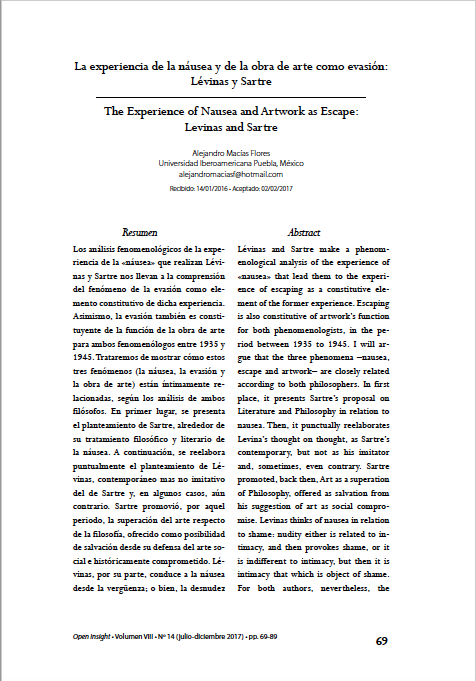La experiencia de la náusea y de la obra de arte como evasión: Lévinas y Sartre
Resumen
Recibido: 14/01/2016 • Aceptado: 02/02/2017 Los análisis fenomenológicos de la experienciade la «náusea» que realizan Lévinas y Sartre nos llevan a la comprensión del fenómeno de la evasión como elemento constitutivo de dicha experiencia. Asimismo, la evasión también es constituyente de la función de la obra de arte para ambos fenomenólogos entre 1935 y 1945. Trataremos de mostrar cómo estos tres fenómenos (la náusea, la evasión y la obra de arte) están íntimamente relacionadas, según los análisis de ambos filósofos. En primer lugar, se presenta el planteamiento de Sartre, alrededor de su tratamiento filosófico y literario de la náusea. A continuación, se reelabora puntualmente el planteamiento de Lévinas, contemporáneo mas no imitativo del de Sartre y, en algunos casos, aún contrario. Sartre promovió, por aquel periodo, la superación del arte respecto de la filosofía, ofrecido como posibilidad de salvación desde su defensa del arte social e históricamente comprometido. Lévinas, por su parte, conduce a la náusea desde la vergüenza; o bien, la desnudez provoca vergüenza a la intimidad, o bien se vuelve indiferente y, entonces, es la intimidad la que es motivo de vergüenza. Para los dos autores, sin embargo, la vivencia de la náusea, sea que nos ponga en relación con nuestra contingencia o con la existencia como necesidad de la que evadirnos, sea que nos coloque «por encima» o «por debajo» del pensamiento, es la misma desnudez de ser lo que nos muestra: nuestra contingencia.Citas
Balcarce, G. (2010). “Franz Rosenzweig y la anticipación de la eternidad”. Cuadernos
de Filosofía (55): 117-140.
Batnitzky, L. (2000). Idolatry and Representation. New Jersey: Princeton University
Press.
Bertolino, L. (2000). “La filosofía del nulla in Fran Rosenzweig”. Annuario Filosofico
(16): 257-287.
Blond, Louis. 2010. “Franz Rosenzweig: Homelessness in Time”. New German Critique
Fall (37): pp27-58.
Casper, B. (1998). Das Ereignis des Betens. Grundlinien einer Hermeneutik des religiösen Geschenhens. Frieburg, München: Alber.
Dussel, E. (1996). Filosofía de la Liberación. Bogotá: Nueva América.
Eliade, M. (1954). Cosmos and History, The myth of the eternal return. New York: Harper Touchbooks.
Garrido-Maturano, Á. (2010). Ensayo sobre el sentido filosófico, cosmológico y religioso del tiempo. Buenos Aires: Biblos.
Garrido-Maturano, Á. (2004). “El tiempo que acontece por sí mismo”. Thémata (32):
pp. 99-118.
Gershom, S. (2012). “On Franz Rosenzweig and His Familiarity with Kabbala Literature”.
Naharaim (6,1): 1-6.
Heidegger, M. (2012). Ser y tiempo, J.E. Rivera, trad. Madrid: Trotta.
Lucca, E. (2012). “Gershom Scholem on Franz Rosenzweig and the Kabbalah. Introduction to the Text”. Naharaim, (6-1): pp 7-19.
Lévinas, E. (2016). Totalidad e Infinito, M. García-Baró, trad. Salamanca: Sígueme.





